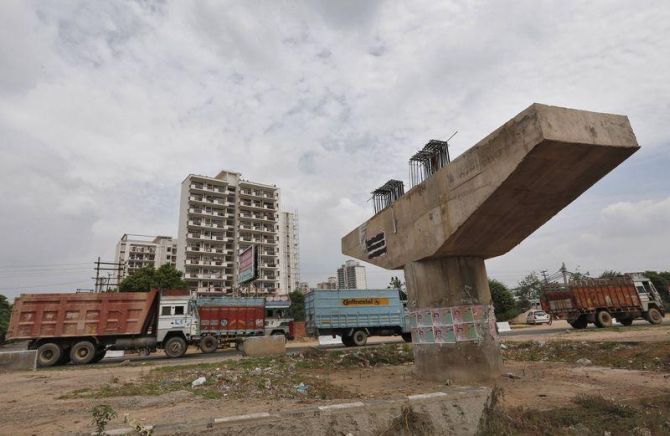If 4,000 workers could work round the clock for the construction of the new Parliament building, then there is no reason why all infrastructure projects too cannot follow that model, asserts Dr Sudhir Bisht.

After getting a lot of brickbats, and very few bouquets, over his appeal for 70-hour workweek, Nagavara Ramarao Narayana Murthy, or NRN as he referred to in IT circles, has said something that has not found much media attention.
Narayana Murthy's comment came on November 29, during a conversation with the Zerodha co-founder Nikhil Kamath at a Bengaluru Tech Summit.
The discussion was on the requirements for Bengaluru's development in the next 5 to 10 years.
Murthy batted for a three-shift working to speed up important infrastructure projects like the Metro project in Bengaluru.
He said that the government and various other agencies must give up the one-shift working pattern on important infra projects. He pointed out that the developed nations do at least two shifts on infra projects and if India needs to step up, it must ensure round-the-clock work on these projects.
Why has Murthy's suggestion on the infrastructure met with so little response?
Oddly enough, the utterance by the founder of the Rs 6 trillion ($73 billion) IT giant, received very little attention, which is in stark contrast to the heavy backlash his 70-hour workweek had received.
This may be because the workers in the infrastructure sector are the silent types, inconspicuous and low profile.
Most workers on construction sites come from far-off places and don't have a social media profile where their feelings find an expression with the vocal opinion makers and their followers.
I am, however, in complete agreement with Murthy's thoughts this time.
In the three-shift work suggested by Murthy, there would be a huge relief to the infrastructure workers and it would give a boost to the infra companies as well. Before I dwell further let me explain what an infrastructure sector is.
The meaning of Infrastructure
The word 'infra' in French means below or underneath and 'structure' stands for a building. The word was first used in the last decade of the 19th century to mean the foundation on which the economy of a nation (or a state or a city) is built.
It could mean the electricity grids, the roads infrastructure, the telecom fibre networks, the PNG underground pipelines, the BTS stations and the water pipelines, the sewage systems, the waterways, the airports, the bus termini, the fuel stations, the EV charging stations, the railway network, the road transport network, the shipping ports, the petroleum products pipelines, etc.
These are the basic foundation of a strong manufacturing as well as service industry. If the infrastructure sector is poor, the economy can never prosper.
For example, in the absence of a robust telecom network, the IT sector and its related industries would simply refuse to take off. The banking, financial services and insurance (BFSI) sector would be a non-starter and the fintech sector would collapse.
The importance of Infrastructure in a country's economy
To understand the importance of the infrastructure let’s look at Nigeria, the most populous nation in Africa and among the top crude oil exporting countries in the world.
It produces approximately 1,350,000 barrels of crude per day and consumes just 400,000 barrels of petroleum products daily.
However, it is ironic that despite being a big crude oil producer, Nigeria has to import most of its finished petroleum products. This is because Nigeria has a very poor refinery infrastructure.
A report in Nigeria's popular daily The Punch, reads:
'Nigeria has an average refining capacity of 10,600 bpd in five years, making it the OPEC member with the lowest refining capacity.'
Nigeria has meagre refining capacity and it also suffers from lack of adequate pipeline network to transport the finished petroleum products. The petroleum products are transported mostly by tank-trucks or Bulk Road Vehicles, as they are called in West Africa.
This is the most inefficient way to transport petroleum products over large distances. It is due to the lack of infrastructure in the petroleum sector, that the retail oil prices of petrol and diesel are so high in Nigeria in spite of very low VAT of 7.5%.
One of the important benefits of robust infrastructure planning and execution is that if completed on time, the cost of infrastructure is recovered in in a pre-defined period. A great infrastructure can't be built on cost overruns due to delays and faulty planning.
I quote from an Economic Times report:
'A recent monthly flash report by the ministry of statistics and programme implementation has revealed that there have been considerable cost overruns in the central government's Dwarka Expressway project. In some packages of the Dwarka Expressway there have been cost overruns to the tune of 47% of the original cost of the package.
I explained the merits in the suggestion given by Narayana Murthy for a 3-shift work in the infra sector. I can see the following benefits very clearly:
1. A three-shift workday would help in 100% asset utilisation.
All infrastructure projects typically use very expensive equipment. Most equipment is very expensive. For the purpose of simplicity let us assume that five JCB Backhoe loaders are required for a project and each cost roughly Rs 25 lakh.
If a loader just works for 9/10 hours in a 12-hour shift, including the rest period for the driver, its utilisation is extremely poor. The asset is wasted for over 13/14 hours in a day. A three-shift working would sweat the asset wonderfully well.
2. Apart from the efficient utilisation of resources, increasing the number of shifts would result in lowering of finance cost as the projects would be completed on-time or even before time.
The interest paid by the NHAI's InvIT (Infrastructure Investment Trust) bond is up to 8.5%. This is a very significant interest and every delay would add to the overall cost of the project. A 3-shift workday would be a big game changer and would prevent any escalation of finance cost.
3. A timely completion of an infrastructure project has a force multiplier effect on non-infra projects too. The first phase of the Redline project of Delhi metro was completed in December 2006, a good three years before the target date.
This ensured zero cost overrun and led to the fast-paced development of real estate projects in that particular area in Delhi.
4. Speedy deployment of infra projects lead has positive social impact. In reply to a question raised in the Rajya Sabha on December 6, 2023, the minister of state for education, Annapurna Devi, stated that government schools in Bihar, Mizoram, Odisha and Telangana had the lowest Internet connectivity in the country. Bihar had just 5.9% Internet connectivity in its government-run schools.
This means that the children of Bihar government schools will find it extremely difficult to attend a virtual conference, as compared to the children of Delhi government schools, where the Internet connectivity is 100%.
A three-shift network rollout plan in Bihar would help Bihar schools achieve a 100% Internet connectivity much quicker than if things were to move at the current pace.
5. My final point is that a three-shift workday is very good for the workers. A three shift would essentially mean working in the morning shift from 6 am to 2 pm; followed by the 2 pm to 10 pm shift; and the night shift that starts at 10 pm and ends at 6 am the next day.
This means that the workers would get to work for eight hours only instead of 12 hours that seems to be the norm in present times.
The standard industry practice of 12-hour shift, six days a week, results in 72-hour workweek. This is in contravention to the model 48-hour workweek as proposed in the Factories Act, 1948.
I quote from the Web site Paycheck.in that states, 'As per the Factories Act 1948, every adult (a person who has completed 18 years of age) cannot work for more than 48 hours in a week and not more than 9 hours in a day. According to Section 51 of the Act, the spread over should not exceed 10-1/2 hours.'
We do have a precedent of infra projects getting completed at a very rapid pace. The new Parliament building is a shining example of a three-shift working pattern. If 4,000 workers could work round the clock for the construction of the new Parliament building, then there is no reason why all infrastructure projects too cannot follow that model.
The implementation must, of course, follow all the safety protocols and the standard HSE practices.
I call for the governments and all captains of India's infrastructure sector to heed Narayana Murthy's wonderful advice.
Dr Sudhir Bisht, author and columnist, writes from New Delhi.










